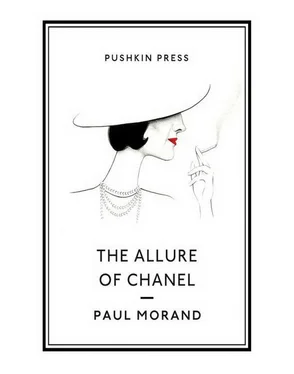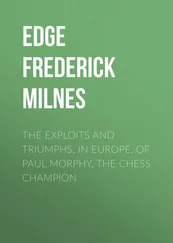Because I had worked out on my own that which cannot be taught. I will return to this frequently. For the time being, I want to end on this important aphorism, which is the secret of my success, and perhaps that of civilisation; confronted with ruthless techniques of doing things: it’s with what cannot be taught that one succeeds .
I had run away. My grandfather believed I had returned home; my aunts thought I was at my grandfather’s house. Someone would eventually realise that I was neither with the one nor the other.
I had followed M B and I was living in Compiègne. I was very bored. I was constantly weeping. I had told him a whole litany of lies about my miserable childhood. I had to disabuse him. I wept for an entire year. The only happy times were those I spent on horseback, in the forest. I learnt to ride, for up until then I hadn’t the first idea about riding horses. I was never a horsewoman, but at that time I couldn’t even ride side-saddle … The fairy tale was over. I was nothing but a lost child. I didn’t dare write to anyone. M B was frightened of the police. His friends told him: “Coco is too young, send her back home.” M B would have been delighted to see me go, but I had no home any more. M B had just broken off his relationship with a well-known beauty of the period, Émilienne d’Alençon; his house was full of photographs of her. “How lovely she is!” I said to him naively. “Could I meet her?” He shrugged his shoulders and replied that it was impossible. I didn’t understand. M B was afraid of the police, and I was afraid of the servants. I had lied to M B. I had kept my age a secret, telling him that I was nearly twenty: in actual fact I was sixteen. I made an appearance at the Compiègne races. I wore a straw boater, set very low on the head, and a little country suit, and I followed events from the end of my lorgnette. I was convinced no one was taking any notice of me, which shows how little I knew about life in the provinces. In reality this ridiculous, badly dressed, shy little creature, with her three big plaits and a ribbon in her hair, intrigued everybody.
M B took me to Pau. The mild winters in the Basses-Pyrénées; the babbling mountain streams that flow down to the plains; the fields that are green in every season; the tall, grass-covered jumps, the red coats in the rain, and the best fox-hunting land in Europe …
In the distance I could see the old castle with its six towers and the snow-capped Pyrenees standing out against the blue sky. The saddle horses, the hunters, the half-breeds, the people from Tarbes who had been wandering around the Place Royale since morning. I can still hear the sound of hooves on the cobblestones.
In Pau I met an Englishman. We made each other’s acquaintance when we were out horse-trekking one day; we all lived on horseback. The first person to take a tumble stood the others a glass of Jurançon. The wine was young, intoxicating and quite unusual. The young man was handsome, very tanned and attractive. More than handsome, he was magnificent. I admired his nonchalance, and his green eyes. He rode bold and very powerful horses. I fell in love with him. I had never loved M B. Not a word was exchanged between this Englishman and me. One day I heard that he was leaving Pau.
“You’re going away?” I asked.
“Yes, unfortunately,” he said.
“At what time?”
The following day, I was at the station. I climbed onto the train.
THE NAME OF THE HANDSOME ENGLISHMAN was Boy Capel. He didn’t know what to do with me either. He took me to Paris and set me up in a hotel. Young M B, who was very distressed, was packed off to Argentina by his family.
M B and Capel had taken pity on me; they thought of me as a poor, abandoned sparrow; in actual fact, I was a monster. I gradually learnt about life, I mean how to cope with it. I was highly intelligent, far more intelligent than I am now. I was unlike anyone else, either physically or mentally. I liked solitude; instinctively I loved what was beautiful and loathed prettiness. I always told the truth. I was very opinionated for my age. I could tell what was fake, conventional or bad. Paris made me feel dreadfully frightened. I didn’t go out. I knew nothing about the world. I was unaware of social nuances, of family histories, the scandals, the allusions, all the things that Paris knew about and which are not written down anywhere, and since I was much too proud to ask questions, I remained in ignorance.
Boy Capel, a highly cultured man and an eccentric character, eventually came to understand me very well.
“She looks frivolous,” he would say, “but she isn’t.”
He didn’t want me to have friends. He added:
“They would damage you.”
He is the only man I have loved. He is dead. I have never forgotten him. He was the great stroke of luck in my life; I had met a human being who did not demoralise me. He had a very strong and unusual character, and he was a passionate and single-minded sort of man; he shaped me, he knew how to develop what was unique in me, at the cost of everything else. At the age of thirty, at a time when young men fritter away their wealth, Boy Capel had already made his fortune in coal transportation. He owned a stable of polo ponies. He was one of the lions of London society. For me he was my father, my brother, my entire family. When war came, he knew how to win over old Clemenceau, who thought the world of him. His manners were refined, his social success was dazzling. He was only happy in the company of the little brute from the provinces, the unruly child who had followed him. We never went out together (at that time, Paris still had principles). We would delay the delights of advertising our love until later, when we were married. One day, however, on a whim, I insisted that Boy Capel should put off attending an important gala at the Casino in Deauville and dine there alone with me. All eyes were on us: my timid entrance, my awkwardness which contrasted with a wonderfully simple white dress, attracted people’s attention. The beauties of the period, with that intuition women have for threats unknown, were alarmed; they forgot their lords and their maharajahs; Boy’s place at their table remained empty. Pauline de Laborde and Marthe Letellier could not take their eyes off me. One of the elegant celebrities recalling that dinner to me, which I had forgotten, many years later, commented: “That evening you gave me one of the greatest shocks of my life.” “How well I understand Boy deserting us for her,” said an Englishwoman at that dinner party; her objectivity merely poured oil on the fire.
My success dates from that evening; to begin with it was an English success. I have always succeeded with the English, I don’t know why. Relationships between England and France have been through many trials, but my English friends have always remained loyal to me. One of them confessed to me, not long ago: “Since I’ve known you, I’ve come to like France again.”
Boy Capel’s beautiful girlfriends would say to him angrily: “Drop that woman.” Not being in the least jealous, I pushed him into their arms; this baffled them and they kept on repeating: “Drop that woman”. He replied in that utterly natural way he had, one that astonished people in an age of poseurs: “No. You might as well ask me to chop off a leg.” He needed me.
M B returned from Argentina. He brought me some lemons, rotten ones what’s more, in a bag.
“How are you getting on with your Englishman?”
“I’m getting on … as men and women do.”
“That’s perfect. Continue.”
This simple bit of dialogue conveys badly what was an extremely complicated situation. Today everything is easy. Speed governs affairs of the heart, as it does everything else. But before the situation was resolved, there were tears and quarrels. Boy was English, he didn’t understand; everything became muddled. He was very moral. I distanced him from his friends, who loathed me. They lived with tarts. Boy hid me away; he wouldn’t allow me to go around with them. I asked him why.
Читать дальше












